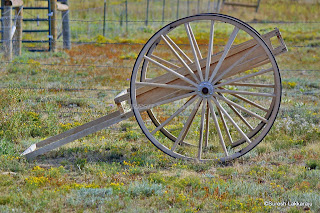This is an Interesting topic in photography. It creates lots
of doubts and questions the user to judge the pictures to classify the art into
vertical or horizontal frames. We come across several structures, buildings and
monuments spread across globe, both ancient and modern during our visits to
tourist centers and we try to capture them into our cameras using the best
techniques we know. Encompassing these huge structures into single frames using
different types of lenses and options available in cameras is somewhat
technical and challenging. Taking pictures of tall structures from ground to
show their heights or taking shots of landscapes from summit showing the depths
of land features like valley, beaches, rivers etc. goes into Vertical
Photography. Normally we turn the camera sideways to cover the topic
and take Vertical Pictures. Usually the camera lens is designed to cover
Horizontal frames and hence we hold the camera here in normal position. Experts
also call taking pictures from high altitude by placing camera airborne (Aerial
Photographs) as Vertical Photography.
Knowingly or unknowingly several photographers click Vertical pictures during
their life time of taking pictures.
I am categorizing these pictures into Architecture since I
covered mostly structures and buildings of historical and modern times.
Few pictures I took on Vertical
frames are shown here:
Click on each picture to see in large format
This picture falls under both categories of vertical and horizontal
since, I tried to cover the total height of Bahai Temple/Lotus Temple and at
the same time I tried to show entire structure in single frame covering all
petals. You can compare the size of structure with birds flying over structure
and people near the structure.
Exposure time: 1/200, ISO: 100, F-stop: 1/10 and lens focal length at 55mm.
This picture shows the Vertical Structures of modern times
the Office Complex at Denver Downtown built and covered with Blue Glass. Looks
like Seven tall structures are placed adjacent to each other in a mirror
effect.
I tried to cover the vertical details of Loretto Chapel of New
Mexico from base to ceiling in this picture using my
handheld point and shoot camera. Had I used the special lens, I could have
covered the complete details of ceiling in a single frame. Good example to know
what we miss if we don’t use special lenses for huge structures to cover in-doors
in vertical photography.
This picture is good example to cover vertical structure at
outdoors. I captured the temple entrance structure of Mangalagiri in India, from
base to top showing 11 tiers one above each and at top covering 11 spikes of
temple which is typical south Indian temple architecture.
This is another picture of modern architecture showing
vertical structure. Mostly Uniform pattern is adopted in modern construction
giving special emphasis to square windows.
Nice example for Vertical Photography showing several
sections of structure. Here the camera position is placed horizontally to cover
the details of Vertical structure taking shot from base which is unconventional
in vertical photography. Ancient structure seen in this picture is Hawa Mahal
in Jaipur, India
and has 953 windows covered in 5 levels of structure. Exposure time: 1/250, ISO: 400, F-stop: 1/40 and focal
length at 18mm.
This is a tricky shot I took at Taj Mahal, India.
This picture shows the vertical column of a structure on one side of the
monument. In and Out pattern of marble carvings show 3D depth on structure but
in reality the design is laid on single marble sheet/wall giving us the
Illusion of angled corners in structure. Truly it is flat marble sheet showing
us this effect. It is viewed only in Vertical angle from base to top. Superb
architecture is seen at Taj.
Another trick shot showing the depth of perception in
Vertical Photography. Camera is placed in angle to cover the pathway showing
all entrances in a single shot.
This picture shows the ceiling of a monument which I took
lying flat on the floor and positioning the lens towards roof. In this picture
if you look at circles it shows the depth. If you look at center it shows the
projection and makes you feel that this picture is took from top. Tricky isn't it?
Do you call this Vertical photography since I covered tall
structure of building or Horizontal photography since I covered wide area of
structure?
I took this picture at New York Rockefeller Center. Tall structure of GE building (70 floors & 870 ft. tall) was captured using simple point and shoot camera of 6 mp at dusk from base to top. Good example for vertical photography.
One more picture of tall structure from ground to sky view of CN tower in Toronto, Canada. This structure is 1815 ft. tall and it took some time for me to cover entire structure to capture in one frame using point and shoot camera with only sky as backdrop.
I took these two pictures from flight. Since we are talking
about Vertical Photography, I thought I should show these under this category.
Though this type of picture taking is called vertical photography they cover
details of wide area and hence can be categorized into horizontal photography
too…
In this picture you can see details of river with Islands,
harvested crop lands, yet to harvest crop lands, settlement area, roads, canals,
lakes and islands.
This picture shows (built-up area) vertical line-up of
residential homes of a city.





































































